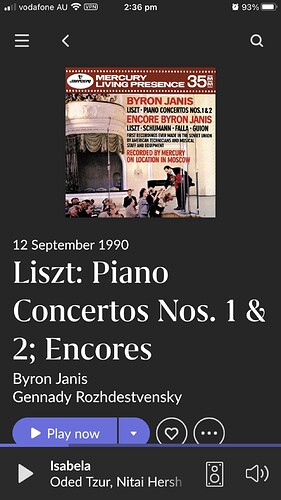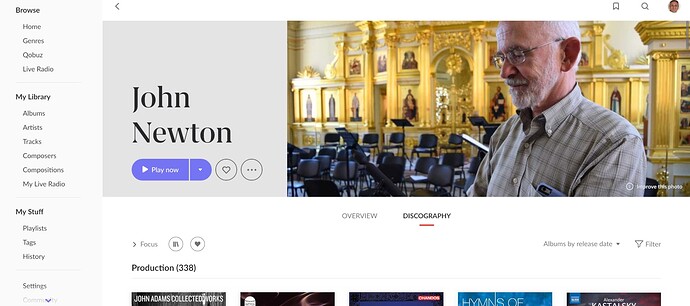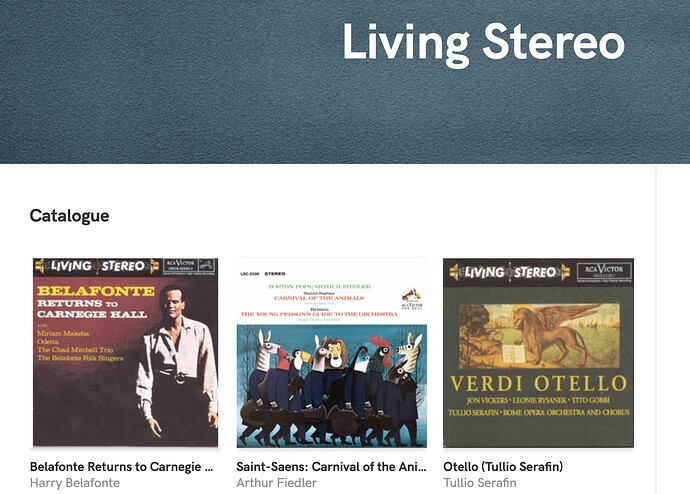Beautiful playing and recording. Mompou always a pleasure
dCS made a little documentary on the Mercury Living Presence series (and their role in the digitising of them).
Despite what the chap says at the end, it’s not particularly easy finding the releases on Qobuz, and the ones I’ve found are all red book and not high res.
I managed to find a few of the original SACD releases, but then gave into temptation and bought all 3 of the Mercury Collector’s Edition box sets. To my (ageing) ears, the original mastering and recording is exceptional, and even the CD sound quality is outstanding. Antal Dorati originally recorded Stravinsky’s Firebird in 1959 - apart from the tape hiss, it could have been yesterday!
Most of the individual Mercury recordings are still available on Tidal and Qobuz. If you want a full list of the Mercury Living Presence releases, Discogs is a good place to start…
Thanks for this reply. Yep, it was just that from the way he was talking at the end of the video it sounded like he was saying all the recordings will be available in high-res on Qobuz, which may be true, but I haven’t found any of them.
The Mercury hi-res recordings are certainly hard to find on Qobuz. I managed to find this one at 96/24, but that was after checking around 10 other Redbook recordings. Hopefully, they will bring more hi-res versions in the future.
Thanks for these! The more the merrier. Ive been going through Roon’s Similar Albums suggestions to try to fish out more MLP recordings. I’m on Tidal and Apple Music and keen to track down as many as I can on both services. This morning found one of the Moscow Recordings on 35mm film: Balalaika Favorites (Ossipov State Russian Folk Orchestra).
Even on 44.1 Redbook, I have found the SQ on Mercury Living Presence to be exceptional. Coming from a movie background, Robert Fine had developed amazing skills in microphone placement and recording technology which emphasised fidelity, optimised to the hall acoustics, rather than spot-miking every instrument for later mixing, which is regrettably the standard approach today. The streaming services don’t make it easy to search for recordings by label, so it may be helpful to use Discogs to identify conductors and performances, and then select individual albums on Qobuz or Tidal.
It’s also worth finding some of the original Decca and RCA recordings of the same era - late 50’s to late 60’s. They had an impressive roster of artists, and both companies had developed breakthrough technologies to support recordings for stereo LPs. As a result, you can hear almost everything just as it was recorded, even on Redbook. As just a couple of Decca examples, Monteux’s performance of Ravel’s Daphnis et Chloe is still exceptional, almost seventy years after it was originally recorded,

and John Culshaw’s productions of Georg Solti conducting Wagner’s Rheingold and the whole Ring cycle have been benchmarks ever since they were recorded.
The world of classical music is an endless ocean, always reviving with the tides and waves of new interpretations, new recordings, each one completing, sometimes replacing the former… There is no such thing as a path to discovering classical music; each one of us is the path. It is made of encounters, family and friends, concert halls, and now streaming services like Tidal, Qobuz, and of course Roon. Roon offers me a new way. I have always been sensitive not only to the interpretation, but first and foremost to the recording. Because i know that I listen to a reproduction. I then would like to pay tribute to the sound engineers. They actually make what we hear. With the composer and the interpreter, they are the third artist, the one that along with my gears and my listening room helps me suspend my disbelief… This week I (re)discovered John Newton, no way I will introduce him to you, I think he is too famous. But if you don’t know his work, just take a look at his discography; it’s worth it!
Here are my favorite:

You can easily search Qobuz for Mercury Living Stereo (rather than Presence). Search by label on Qobuz and they’ll list about 100 albums (Redbook, with very few Hig-Res).
You also find some Mercury playlists on Qobuz. The first one is pretty extensive.
Thanks for this. As you say, Qobuz (and Tidal) have a good selection of classic recordings, originally released by Mercury, RCA and Decca, mainly from the late 50s and early 60s,
However, it’s worth remembering that Mercury Living Presence was actually a completely different label to RCA Living Stereo - it’s quite easy to confuse the branding as these labels were competing head to head at the time. The engineers on both labels were exceptional, as Diego reminds us in his post about John Newton who engineered many of the classic RCA Living Stereo recordings, working as a team with producers like John Pfeiffer. As Diego says, “they actually make what we hear”.
In the UK, the leading classical engineering and production team was from Decca. While the great EMI producer Walter Legge was quoted as saying “over my dead body” when asked to record in stereo (although he eventually agreed - see below), John Culshaw and the Decca engineering team jumped at the opportunity and made some fantastic recordings which are still benchmarks today. A few years ago, the BBC broadcast a series “The Decca Boys” which described their achievements, and gives a useful list of recommended recordings, referenced in the notes below. I hope these recordings give as much pleasure to the Roon community as they have to me.
https://www.bbc.co.uk/radio3/thedeccaboys/pip/sh8fr/
https://www.bbc.co.uk/radio3/thedeccaboys/pip/6d5q4/
PS - Walter Legge certainly redeemed himself later with some fabulous EMI stereo recordings starring his wife, Elisabeth Schwarzkopf, as well as Christa Ludwig and many others. These included two great Richard Strauss performances - Der Rosenkavalier
Both strongly recommended.
I’ve added the RCA Living Stereo and Mercury Living Presence boxes to my Discogs watchlist. They sometimes show up for really good prices, occasionally with a disc or two missing, but they’ve usually gotten snapped up by a quicker buyer by the time I’ve seen them. ![]()
Roon/Qobuz as a combo is a blast! Bach refreshed through V. Olafsson. H. Grimaud and S. Gabetta introducing new to me works as well. Filling in H. Hahn’s work (have a couple of her CD’s prior to signing up for Qobuz then recently Roon).
A nice shot of my mentor Frederick Fennell is in there.
Good shout. Frederick Fennell was the person who first got me listening to wind band music. Lots of albums on Mercury Living Presence, but he also recorded for Telarc and introduced me (and many others) to Holst’s two Suites for Military Band. This isn’t just a great album but also a serious test for your headphones or speakers - for example try the bass drum at the start and end of the March (track 3 of the first Suite).
And on the subject of Telarc, great performances (and amazing audio quality, including the bass drum), I can also recommend their recording of Verdi’s Requiem, conducted by Robert Shaw, who had worked closely with Toscanini. The great Italian was clearly impressed, as he said “As for Robert Shaw, I have at last found the Maestro I have been looking for.” He also founded the Robert Shaw Chorale - a beacon of choral excellence and racial integration in the post-war USA. Most importantly - he was a fantastic choral conductor - just listen to track 2 - Dies Irae. Even by today’s standards, this is still a benchmark recording.
the solo singing is very good too.
I’m glad I stumbled on this thread. It’s great. But I’d like to know where your “swimming” in music quality comes from. Much of my stuff (music) is mixed up; Faust (the opera) is out of sequence. I don’t have a foggy about how to bring the tracks into proper sequence. I hope this is the place to find out. Another problem is those operas that start with a prelude are gray circles with an entry stating ‘unknown performer.’
It depends on your source. Most of my operas were ripped from CDs and automatically recognised by Roon. Unfortunately Tidal seems to have a major problem with classical - especially track order and tagging. I can recommend Qobuz as an alternative - much better for classical, more Hi-Res, includes some 5.1 classical surround, most tracks are in the correct order, and also includes pdf booklets for many releases. I currently subscribe to both, in order to get maximum coverage of non classical music.

















